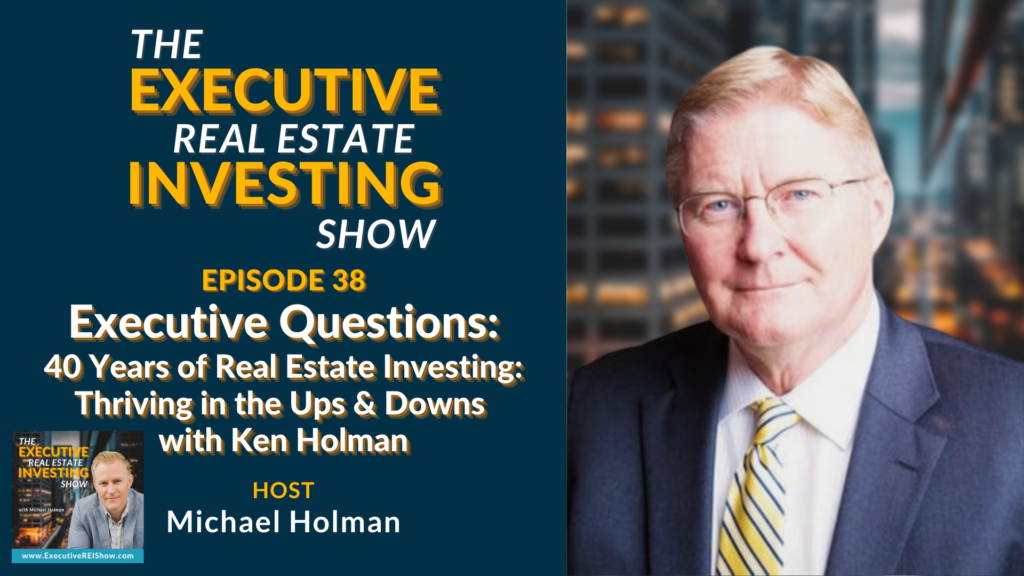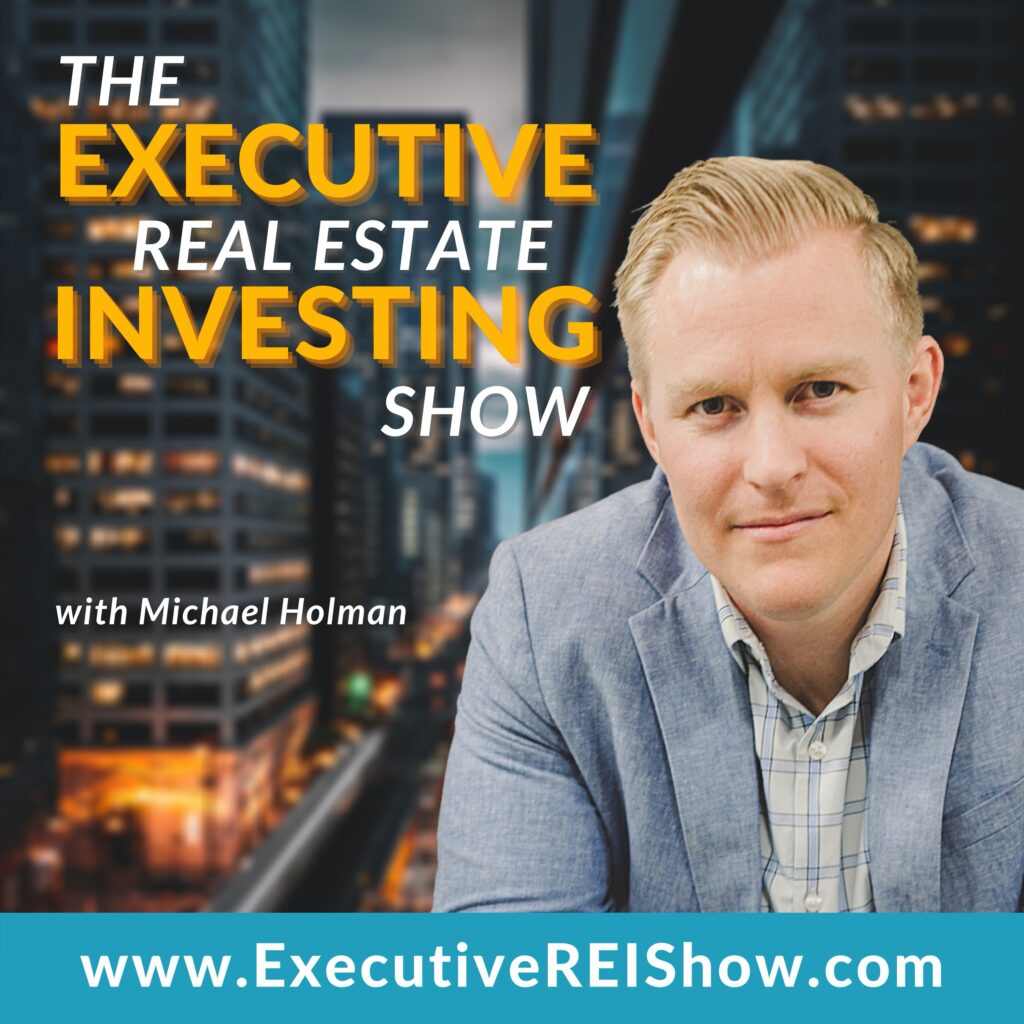
The executive Real estate investing Show
EPISODE 38
40 Years of Real Estate Investing: Thriving in the Ups & Downs with Ken Holman
- February 28, 2022
EPISODE SUMMARY
As part of our ongoing series Executive Questions, host Michael Holman flips the script and brings back his father, Ken Holman for a round of Q&A. Topics include commercial real estate investing experience, favorite thing about investing in commercial real estate, tell us about your best and worst deals, and much more!
Listen now as Ken answers these questions and expands on each topic to give his advice, based on 40 years of his personal experiences in real estate investing.
To the new investors out there: keep asking questions! The only way to succeed in real estate investing is to keep learning and expanding your knowledge. If you want one of your own questions to be answered on an episode of The Executive REI Show, make sure to click HERE to submit your question!
EXECUTIVE TIP
Save 10% Of What You Make
Save 10% of what you make, make sure the investments you get in have leveraged and compounded then you make sure that when you’re investing invest with wise people that know how to handle your money, and they’re skilled at keeping it safe. Then don’t expect impossible returns. Just don’t over leverage your investments.
LISTEN TO THE PODCAST HERE

The Executive Real Estate Investing Show Podcast
EP 38: Executive Questions - 40 Years of Real Estate Investing: Thriving in the Ups & Downs with Ken Holman
Listen on
READ THE TRANSCRIPT HERE
Note: Audio transcription has been automatically transcribed
Welcome to The Executive Real Estate Investing Show. This podcast is for you, the busy business owner or executive looking to create generational wealth. Here, we’re going to show you how to do that through real estate investing from multifamily to industrial and everything in between. You will become a real estate investing expert. And now, here’s your host, Michael Holman.
Michael Holman: Hello, everyone, and welcome to another episode of the Executive Real Estate Investing Show your host, Michael Holman. We have a great guest with us today, Ken Holman who’s on the show. He’s the one that started Overland Group, he has been in the Real Estate business for over 40 years, there is some things that he mentioned in this episode that are golden. I think things that probably only people with 40 plus years of experience in Real Estate could really understand and give. The things that he says are just insightful. You hear a lot of from a lot of different people. But people who’ve been in Real Estate for 40 years, they just think about Real Estate investing, they think about Real Estate differently, than those of us that have been in there less than that. If somebody who’s been in Real Estate for three or four years versus 40 years, they talk they think they look at each scenario differently. You’re getting some of that insight. Love it, check this one out.
Before we get started. If you have not been on the website yet, I don’t know how many times I have to tell you, but I am going to keep telling you, www.ExecutiveREIShow.com. Check it out. We would love to get your questions answered, go ahead, and ask an executive question we’ll get that answered on this show. You can also subscribe to the newsletter, get all that Real Estate information right in your email once a week. It’s fantastic. You can also go see all the previous episodes. Check out the show notes, check out all the resources from those shows. You can go there, you can get in touch with somebody, I got to go meet this person, I have to establish that relationship, I need to build my network.
Great way to do it, go check out the show notes www.ExecutiveREIShow.com. Also, go ahead and leave us a rating and review. Whether you’re listening on Google, Apple, Spotify, wherever it is, we would love to get your rating and review and see how we’re doing and potentially even how we can do better. So go ahead, leave us a rating. Super simple, super easy. Just click those stars button and let’s go. We are going to get right into this interview with Ken Holman. Welcome to 40 years of Real Estate investing, thriving in the ups and downs. We have Ken Holman with us today. We’ll introduce him shortly. We are excited to drill him on all things of his Real Estate investing career and life. We’re going to get into it, I promise. We’ll see, we might make Ken squirm a little bit with some of the questions we ask.
We have Ken Holman with us today. Just a little bit of background on Ken. Ken is the president of Overland group and has over 40 years of Real Estate investing experience, he has developed over $350 million worth of Commercial Real Estate, and he also holds just about every top designation you can get in the Real Estate world. I’m going to go ahead and turn it over to Ken just to introduce himself a little bit before we get into the questions, Ken.
Ken Holman: Thanks, Mike. I get a little nervous when somebody says they’re going to grill me, but I guess I’m considered the senior member of our group. I’m excited to be with everybody today. Both Mike and I have degrees in accounting. Don’t hold that against us. He has a master’s in accounting. I have a master’s in Business Administration. But we really enjoy this business. We’re excited that you can join us today.
Michael Holman: Perfect, thank you. We’re going to do things a little bit differently today. What we’re going to do is we’re going to spend the majority of our time today, doing some Q&A with Ken, and we’re going to get into the good, into the bad we’re going to get into the ugly of 40 plus years of experience he’s had in Commercial Real Estate investing. Let’s get right into it. First question. We’re going to start with some lowball questions, Ken. Tell us what’s your experience in Commercial Real Estate or CRE investing?
Ken Holman: I started out in the Real Estate, syndication, and financial planning business. Right out of school, I got hired by a high-powered firm, and they put me through the paces, and I gravitated to Real Estate. They were doing a lot of Real Estate investing at the time. Eventually, they asked me to manage a property management company. We’re managing over 5000 units in five different states. That was a great time. I was also on an investment, analysis, and acquisition. They started to get a little too aggressive with their projections for me, made me uncomfortable. I turned in my resignation and went out, bought a new suit started my own company, the same week. It was an interesting beginning to a career.
Michael Holman: Sounds like that should be a movie. Buy a new suit. Start your own company, that’s awesome.
Ken Holman: Buy a new suit, go put a lease on an office property and get started.
Michael Holman: Moving on to the next question as a follow up to that. You’ve invested in a lot of things you’ve been around. I’m sure you’ve seen a lot happening, what is your favorite thing about investing in Commercial Real Estate?
Ken Holman: I’ve acquired and invested in virtually every major property type, office industrial, retail, apartments, and hotels, all of them. I think the thing that’s most exciting about this business for me is I love the Real Estate development and construction side of the business; I love being able to analyze a piece of land and acquire it and create something new that’s really kind of exciting for people. I think there’s nothing greater than being able to see something come to life and then see the value begin to be created by it as people ran it up. I just like to see investors create wealth. I think that’s a great program.
Michael Holman: I have a similar feel I get really excited with everyone. I can relate to you. There’s this group mentality when you invest in Commercial Real Estate, everybody wants to see it succeed. It’s fun part of that. Let’s go to the next question. We will give you a chance to brag about yourself for just a second. Have you ever had a homerun deal? What’s one of the best deals that you feel you’ve ever done?
Ken Holman: I’ve had a couple, maybe more than a couple. I remember when the first big apartment deal that I put under contract, I had a large investment company come to me and say they would pay me several $100,000 more than I was going to pay for the property. At the time, I thought I’m not even sure how I’m going to get all the equity capital raised. I don’t mind flipping this deal. I did. It was awesome. In a matter of a couple of weeks. I walked out with a couple $100,000 more than I had to start with and I thought, this was fun. How do I do this again? That was a good deal. Probably one of my best deals that I ever did was a new development a 96-unit high rise apartment project that I built in downtown Salt Lake. Took us several years for us to get it where it needed to be. But in the end, we’d built the project for $5 million, which is amazing in today’s terms.
Michael Holman: A high rise 96? I just had to clarify. You meant to say that $5 million?
Ken Holman: I did and that’s exactly what it was.
Michael Holman: You have been doing this for forty years haven’t you?
Ken Holman: Exactly. We eventually converted it to condominiums and sold it for a multiple of almost four times that amount, which was kind of cool. But I still feel a little sorry that we sold that deal.
Michael Holman: Wait, really? You’re going to have to explain that one to me because that sounds like a sweet deal. Talk to me. Why are you sorry you didn’t keep it?
Ken Holman: One thing that I’ve learned over time with Real Estate, it just keeps getting better and better over time if you maintain it. If you don’t, then it’ll deteriorate. But if you maintain it and keep it up, the rents go up, the operating expenses go up some but not as fast as the rent, and you pay your debt down. If I had that property today, I’d be clocking $50,000 a month in revenue, no debt. Obviously, if you make 17 or $18 million, you can’t feel bad about that, you wind up getting a lot of money, but it’s just Real Estate is such a good long-term investment.
Michael Holman: Moving on, obviously there’s a lot happening today. The economic environment has felt volatile. We’ve been going through ups; we’ve been going through downs. How many economic downturns have you been through?
Ken Holman: I’ve been through two majors. When they did the 1986 Tax Reform Act, that was a major economic downturn. That was in the mid-1980s. I’ll bet there was about 2000 financial institutions, and I mean, big financial.
Michael Holman: 2000?
Ken Holman: 2000, out of about 6000 or so actually went down. There was a ton of properties that were foreclosed on. The government created what was called the Resolution Trust Corp affectionately known by most of us as the RTC. They managed the whole downturn. That was a big one. The other big one was this one that they call the Great Depression. Everybody gives me a hard time because I keep wanting to call it the great recession. But that was in 1929. That was a little before my time.
Michael Holman: The great recession that seems like an obvious to me. You said the great depression there for a second, I might switch this title to 90 years of Commercial Real Estate investing. Ken Holman with us today is 140 years old, everybody. Just to clarify, we are talking about the great recession, correct?
Ken Holman: Yes, that’s exactly what we’re talking about. Not the depression.
Michael Holman: Just clarifying.
Ken Holman: None of us are living on oatmeal today. It’s a great recession. But that was more related to homes than it was the Commercial Real Estate. Although it did impact Commercial Real Estate a little bit. We own several properties, and it didn’t really impact us that much. But it sure did the home market at that time. The two that I’ve lived through that I’ve seen and the thing that I noticed about both of them. There was a ton of opportunities that happened after those two big economic downturns.
Michael Holman: I got two follow up questions to that. One it sounds like you had a lot of foreclosures. It sounds like it was almost common practice during the Tax Reform Act days. You said, 2000, correct me if I’m wrong. 2000 financial institutions went down. I’m interested in a little bit more about that. I mean, how did how did you survive? I mean, did you have properties that they got foreclosed on? Did these financial institutions went out of business? I’m interested to see what happened. How are you still here today then if you went through that?
Ken Holman: It was interesting. I never thought I would outlast companies like American savings and loan which was a $50 billion organization. Here I am and they are no longer. Talking about Broadway tower, which is that project that I felt like I hit a homerun with. We started that 1984 and we honestly thought that in 1986, we were going to get foreclosed on. I went to the savings and loan that I was working with and worked out a forbearance. From there, we were able to get refinance a property with HUD 223F loan, and we just worked our way through it. That’s sometimes what you have to do.
I don’t see that happening in this current economic downturn. I don’t think we’re going to get to that point. I’ll be shocked if we do. But the thing that I’ve noticed about this recession, which I think is happening compared to some of the other situations that we’ve had. I just see everybody working together, the federal government, the state, the financial institutions, we’re all working together. I’ve been amazed at how helpful they have been, with the properties that we’ve had. I don’t want to say this, but some of our projects have done better during this time.
Michael Holman: I got another follow up question, too. You had mentioned during the great recession, you didn’t feel the full impacts of that. That was major for a significant number of people. Talk to me of what you did. I can’t imagine it not affecting you. You have to do something. Tell me what happened.
Ken Holman: In 2007 to 2011. I don’t want to get political. But Congress put a lot of pressure on the financial institutions to lend money, sometimes there wasn’t a lot of pre-qualification to be able to get that to buy homes. So everybody thought it was a great idea to over leverage, I refuse to get into that game, wasn’t trying to buy a home inventory at the time and leverage the heck out of it, and then rent it out. People went through that process. And then we had the subprime mortgage debacle that occurred, and it took down a ton of homes. Almost every home that was overleveraged had a problem. I’m a huge advocate of not over leveraging your investment, even though you think you can get high returns. What we did during that time, is we just pivoted, we had apartments they did well, especially with people that wound up getting foreclosed on, they had to move somewhere. Usually, they moved into apartments. Our apartments did well. We got into Dollar Store investing, Family Dollar, Dollar Tree, Dollar General, Big Lots, Walgreens, Reilly Auto parts, just a ton of them. AutoZone. We bought buildings with national credit payments, and we just sit there and collected our lease payments every month and didn’t have a problem during that time.
Michael Holman: That’s what I see with most successful companies. They managed to pivot.
Ken Holman: There are times when you have to do that. But I’m going to stay in solid asset classes too.
Michael Holman: I like that advice. Staying conservative and being willing to pivot is needed. That’s great advice. Let’s keep going on to our next question. That’s a follow up to the last one. In your opinion, in your experience, how does Commercial Real Estate investing change in economic downturns versus economic booms? You talked about pivoting, maybe you can elaborate some more on that and the differences between downturns and booms.
Ken Holman: You’ll have to look at the economy the way it sits today. What industries are doing well, and what industries aren’t doing well. Those industries that are doing well are really thriving. Those industries that aren’t doing well are really struggling and will for some time before they come back. Things like apartment seem to be stable and they seem to be doing well. Some offices may be struggling with everybody working from home and maybe they get the idea that that’s a great idea. The need for office space might decline, I know that the distribution business with all the online purchasing is just going nuts. I have a feeling that manufacturing is going to be coming back strong since China makes all our medications and drugs that we rely on. I have a feeling somebody is going to have a big conversation about getting the manufacturing sector up and running. I think the name of the game is you have to change with the times and when the markets are really doing well there’s other opportunities and other types of Real Estate investments.
Michael Holman: I think that’s really important. Those are some good points. I feel like some of the times, we have the big companies, just to go off that and agree with what you’re saying. Sometimes you have these big companies that are investing in real estate or really anything else and they’re not capable of changing. They’re not capable of pivoting with the market as needed. It brings them to their knees. That’s a good point. I think that’s good advice.
Ken Holman: Sometimes you hear this term too big to fail. But sometimes if you’re a little smaller, you’re too small to fail, which is nice. You haven’t overleveraged your deals, you get good solid investments and they don’t all have to be in the same product type and you can weather storm.
Michael Holman: Let’s move on. I told you, we’re going put in a spot a little bit. We gave you the opportunity to tell us about one of your homerun deals. I want to hear about now, one of your worst deals. Tell me one of your worst deals you’ve ever done.
Ken Holman: You want me to air my dirty laundry here in front of everybody?
Michael Holman: Absolutely, we are trying to make this as real as possible. It’s easy to find all the good stuff. There’s no way you can be in this business for 40 years and not have a couple of issues. So I want to hear about those.
Ken Holman: Back during the RTC days in the 1980s. We all struggled with some properties and some bigger companies went down. I’m trying to think in the last 30 years, I’ve had some properties that have struggled for a period of time and then done well. There was a time when about 25 or 30 years ago, when me and three Arizona guys decided it was a good idea to buy the Jack in the Box franchise for the state of Utah, from a company called Food Maker, and we each put up a $125,000 and committed to build out the market in Utah.
We got started and build our first three. And every time we build a new one, they look gorgeous. They were wonderful properties. We were just elated with them, and we opened them up and then we lose $5000 a month. That was like, after you built three of those and you’re losing $15,000 a month. This is fun, but it’s not all that much fun. We went back to Food Maker and said okay, we got some problems here. We were performing well, we were at the very top of the performance situation with they’d come in to do surprise audits and we were performing better than anybody in the entire LA market, which is their stronghold. We discovered and this is a thing that relates more to Real Estate than the restaurant business.
We discovered that we had missed our projections and we started delving into that as to why and discovered that the Franchise Disclosure Document that we were given had shown that all the stores were receiving advertising dollars from Food Maker, and we were not. We went back to the company and said hey, you got to give us advertising and they did for one month, they put in $50,000 and our sales shot up. We said hey this is cool, keep it up and they said no, we’re not going to do that. So we said, okay, buy us out. First, they said, no, we’re not going to do that. But we had a good attorney that happened to persuade him otherwise. And eventually, they bought all our stock and inventory and everything and gave us our money back. We still lost some money and a couple of year’s worth of effort and time. But in the end, we were just left with three building leases that we had to release. If you’re talking about failures, that was a bad one.
Michael Holman: That was really good. Nobody likes to lose money on a deal. To me that felt more like the restaurant business than the Real Estate business. Maybe you can go into another deal that specific to Real Estate or Commercial Real Estate.
Ken Holman: Let me say this, every piece of Real Estate is nothing more than a vacant building, if it doesn’t have a business in it. There is basically a business in every building, even apartments, the businesses property management, you’re renting apartment units to tenants who want to live there, and they’re willing to pay money for that experience. What I could say is, whether it’s a restaurant business, the apartment business, the office business, the hotel business, there is always a business associated with what you’re doing. One of the keys is you have to make sure that the fundamentals are right, the management is right, and the tenant is right, in order to make that deal a homerun. Otherwise, it’s just not.
Michael Holman: Alright, you’ve convinced me. I’ll give you a pass on anymore dirty laundry. That was a good point, though. It’s not something that I’d really considered where I was going. But that is a good point. You’re exactly right. The whole time you were saying that I was trying to think if I could prove you wrong and think of a Real Estate transaction that wasn’t tied to another business transaction. To be honest, you might not be…
Ken Holman: some are easier to manage than others. You do a triple net lease. That’s a simple deal for you, because all you do is collect the rent and rely on that tenant to pay the rent.
Michael Holman: Just thinking about it barely. I was thinking about the triple net leases, too. We have a few. Just earlier this month, I got a letter from one of our retail tenants that said, not paying my rent next month. Sorry. We’re working through that and doing our best to deal with everything. But that was a business that affected the Real Estate behind it. That’s a good point. You’re right. We’ll stick with the Jack in the boxes and losing $5,000 a month. Were you only permitted to build three you had said you are committed to the market…
Ken Holman: We were going to build 24 of these things. But when we start losing $15,000 a month, we weren’t sure if we were losing $5000 per store every time we opened a new store, we were going to make it up on volume.
Michael Holman: By my calculation, you just needed to build out all 24 of those stores. You could have lost probably close to a 100,120, $125,000.
Ken Holman: Yeah, no kidding. I don’t think we would have last that long at that rate.
Michael Holman: Good to know, there’s good and there’s bad in Real Estate and sometimes you (Inaudible 29:07)
Ken Holman: Just like every other investment.
Michael Holman: Moving on to the next question. What’s your advice to Commercial Real Estate investors during volatile economic time? Maybe you were thinking about investing in Commercial Real Estate, and you’re saying no, I don’t know right now. Is your advice to wait, is your advice to just pile on. What advice would you give to people who this is one of their main things that they’re trying to do to build wealth for the future? What do they do during these times?
Ken Holman: I’ll be honest with you, I’ll take a little bit of the Warren Buffett approach to life buy when everybody’s selling and sell when everybody’s buying and so while we’re going through this, I have been canvassing every market that I have targeted, and I’ve targeted about 15 of them that I really like. I have been looking for opportunities. I’m not ready to announce what I’ve got yet. But I have to say, I’ve got a deal that I’m making an offer on today that I absolutely love. The developer was a small developer had been in the apartment business and got over his skis a little bit, and I’m getting a deal that is appraised for more than a million dollars more than it’s going to cost me to buy. I think there are some opportunities in these times. Whether they’re good times or tough times, I think the cardinal rules have to be, don’t over leverage, be careful of the types of investments that you get in, you always want to have a margin of safety on the equity side. You have to have a reasonable cash reserve. You don’t have to go crazy with that. Because it really messes up your returns, but you have to be able to weather at least a mild storm.
Michael Holman: It’s good advice and interesting. That’s cool about the offer. I have a follow up question to that. You almost answered it in your last one. But I’m going to ask it now. What kind of Commercial Real Estate have you invested in during times like these and succeeded? If there’s any I am just as interested if there’s not any times that you’ve succeeded, but what kind of Commercial Real Estate do you invest in?
Ken Holman: Number one, the rule, location, location which is overused is always important. Whatever real estate you get into, you want to do your best to get a good location. But barring that, I have found that apartments tend to be good investments, I found that triple net leases, even though you got to be careful with the retail business, if you get in the right locations, you can do well with a triple net lease situation. I haven’t done much lately with industrial, its sure tugging on me to try to want to get into that side of the business. We’re in self-storage and I think as long as you get well located properties on high traffic streets, you can probably do well with self-storage. Although, I can make cases both pro and con of, of self-storage or some of these others. But frankly, I really like apartments.
Michael Holman: If I were to boil it down and make this really clear for everybody. Are you saying right now your go to or in volatile times your go to investment would be apartments, is that fair to say?
Ken Holman: That is fair to say. Let me qualify that a little bit. Since there’s so much in interest in apartments. I have noticed that everybody wants to use the term value add. They always want to find an apartment project that somebody hasn’t taken care of and they’re able to buy it at a low price go in, do cosmetic fix ups, turn around hold it for a while, get at least up and then sell it for this huge profit. There still some opportunities out there for that, but you run across a lot of issues with that too. You’re buying older properties, you wind up inheriting a certain amount of functional obsolescence, which means ceiling heights may be different.
They may or may not have garages, they may have amenities or not amenities. There’s a whole bunch of issues that can arise. I love if you’re in a situation where demand exceeds supply. I love building new apartment developments. You have to be patient through that process, but you create a ton of value, when you can build it cost and then everybody wants to buy it market because you’ve stabilized it and rented it up. That’s probably my go to.
Michael Holman: We’re going to keep this moving. I had to ask, you’ve had a lot of Commercial Real Estate investing. It seems like everybody has a story or two. Have you had any weird or crazy experiences?
Ken Holman: I’ve had a few crazy experiences, some that relate to Real Estate and some that don’t. I talked my eight-year-old brother one time to take off all his clothes and run around the house and he did it and I locked him out of the house. I thought it was a lot funnier than he did so that was a crazy experience.
Michael Holman: That is not what I was expecting. Do you have any related to Real Estate? If not that’s okay, we’ll move on, we can end with everybody having an image of your eight-year-old brother running outside naked of his house.
Ken Holman: I was doing a due diligence inspection on an apartment project in Houston, Texas, we were going to buy. For anybody that knows Texas, it’s a wild, wild West, they don’t even have any zoning laws down there. So you can pretty much build whatever you want, wherever you want. I was doing this inspection with the manager and going around to every apartment unit. I noticed in the background, way down at the other end of the complex that there was this lady leading horse and I thought, well, I wonder if there’s a corral back here where she’s keeping that. We went and explored and discovered that she was boarding your horse in the second bedroom of her apartment. I’ve never seen anything quite like that before.
Michael Holman: She was boarding her horse in the unit?
Ken Holman: They were ground level units and for some reason she thought it was a good idea to buy a horse and hoard it in the second bedroom…
Michael Holman: Was it a miniature horse?
Ken Holman: No, this was a full sized honest to goodness horse. It said a lot about the manager, how do you miss a horse on your project. I think the other neighbors around her were just keeping quiet about it. But it was crazy.
Michael Holman: I have so many questions.
Ken Holman: Honestly it smelled like a barn. In the end, needless to say, I did buy the project.
Michael Holman: That was going to be my next question.
Ken Holman: I did, I bought the project. I did fire the manager because I felt like if she couldn’t catch a horse on her property, there was maybe some issues. I changed the pet policy, nothing under a thousand pounds. It was hilarious. I am interested how it’s working out for you if you’re keeping it in your bedroom.
Michael Holman: What’s one Commercial Real Estate investing mistake that you’ve made, that you would tell others to avoid?
Ken Holman: I mentioned a little while ago about self-storage. Sometimes you get in your mind that every property type is like every other property type, and you bring your education experience and influence to that new property type you want to get into. I thought self-storage was just like, apartments and you build it, they will come. I discovered that traffic plays a critical role in self-storage. You’ve got to have good perspective, drive by renters, come, and buy your place. Otherwise, you spend a fortune on online advertising just to drive the business to it. One thing that I would suggest to everybody is, if you don’t know that product type or that property type that you want to invest in, you better read a ton of information on it. You better talk to everybody you can, to find out exactly what that property type is like, and what the nuances are with that type of property.
So you don’t get yourself caught in a situation where you just think you know everything and in reality, you find that you don’t know as much as you thought you did. Back in the late 1970s. A long time ago, I was working for this great company who had high powered attorneys, MBAs, financial planners, guys like that. They looked at the apartment market and said, we don’t think that apartments are going to continue to develop like they are now. So we’re going to hunker down a little bit. In hindsight for a bunch of smart guys, that was the dumbest decision I’ve ever seen. Markets will ebb and flow. But do I think that six months or a year from now, the markets going to be tanked and everything’s going to be down, and we’re not going to continue to develop and build and grow? That’s just not going to happen. We are going to continue to grow and develop and that entrepreneurial spirit that we have is not dead.
Michael Holman: Let us get on to the last question. What is the best advice you ever got in relation to Commercial Real Estate investing, and will you share that with everyone else?
Ken Holman: I probably better not tell any more family stories. When I started out, I was working with attorneys, financial planners, insurance agents, stockbrokers, guys like that, and I learned early on, that they know nothing about Real Estate investing. Fortunately, I was able through the school of hard knocks and the education that I had, and just teaching and developing and growing in the Real Estate business the way I have, I was able to mentor myself in that regard and I have learned so much. Over 40 years, I am more convinced today than I ever have been that Real Estate is one of the absolute all-time best investments anybody can have.
I should not say this, because stockbrokers will tell you don’t put more than 5 to 15% of your investment capital into Real Estate. I’m saying if you don’t have about 50% of your investment capital in income producing quality Real Estate investments, you’re doing yourself a disservice. You avoid all the volatility. You put yourself in a position where you can live out the rest of your life in comfort, without worrying about the ups and downs of the stock market. But I that’s a good place to close.
Michael Holman: Is that your advice for everyone?
Ken Holman: Save 10% of what you make, make sure the investments you get in have leveraged and compounded then you make sure that when you’re investing invest with wise people that know how to handle your money, and they’re skilled at keeping it safe. Then don’t expect impossible returns. Just don’t over leverage your investments. I guess that would be the advice I would give to anybody is to follow those principles, they’re pretty good ones.
Michael Holman: Love it and I completely agree. As we wrap up Ken, how can people get ahold of you? What’s the best way to get in contact with you?
Ken Holman: Get on our website, Overland Group, Inc. All our contact, all of my contact information is on there. You can reach me by sending me an email at kholman@overlandcorp.com or give me a call. I’m probably one of the few that will put out my phone number but (801) 231-6650 and yes, I still answer my phone.
Michael Holman: Ken, thank you for coming on the show today.
Ken Holman: Thanks. Appreciate it.
Thank you for listening to The Executive Real Estate Investing Show. Ready to learn more? Go to ExecutiveREIShow.com for more episodes and resources to help you create generational wealth through real estate investing. That’s ExecutiveREIShow.com.
MENTIONED IN THE SHOW
- Connect with Ken Holman
- Overland Group
- Overland Captial
- Overland Investor Portal
EPISODE ARTICLE

Q&A with Ken Holman: 40 Years Through the Ups & Downs of Real Estate
Ken Holman, the Founder and President of the Overland Group, has over 40 years of experience in real estate. His perspective is different from those who have only been in the game for a few years. After weathering several financial storms, making both good and bad deals, and trying his hand at a variety of real estate assets—Ken has a lot of wisdom to share! Ken’s Journey Ken and Michael have worked together with the







